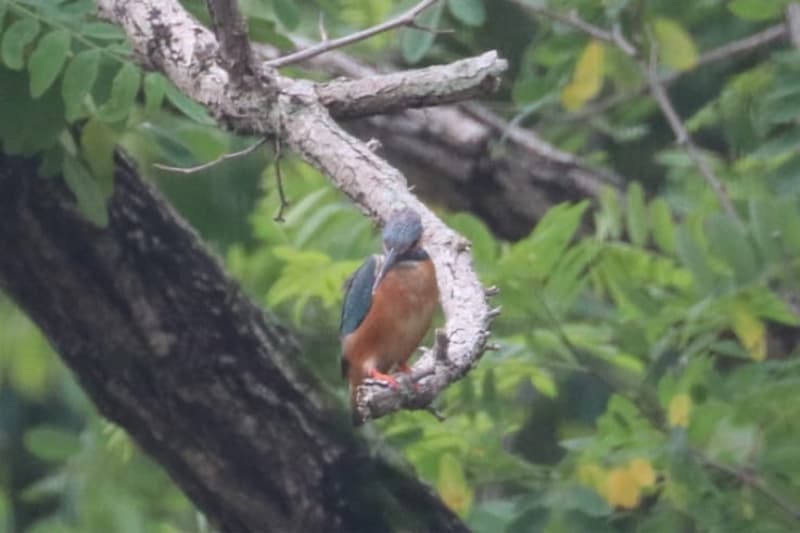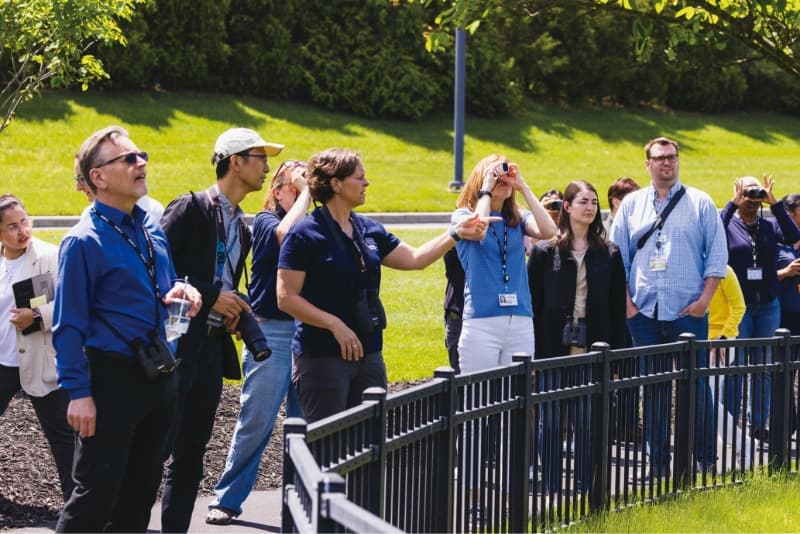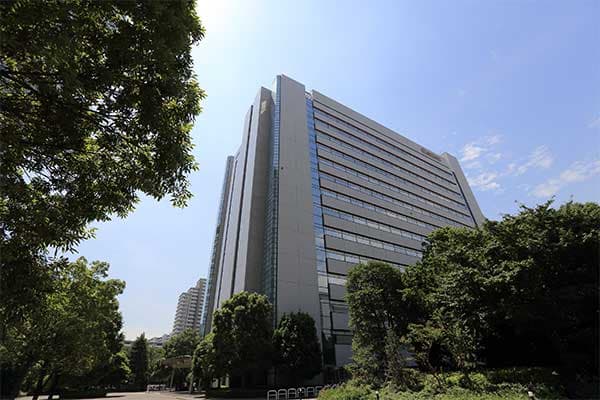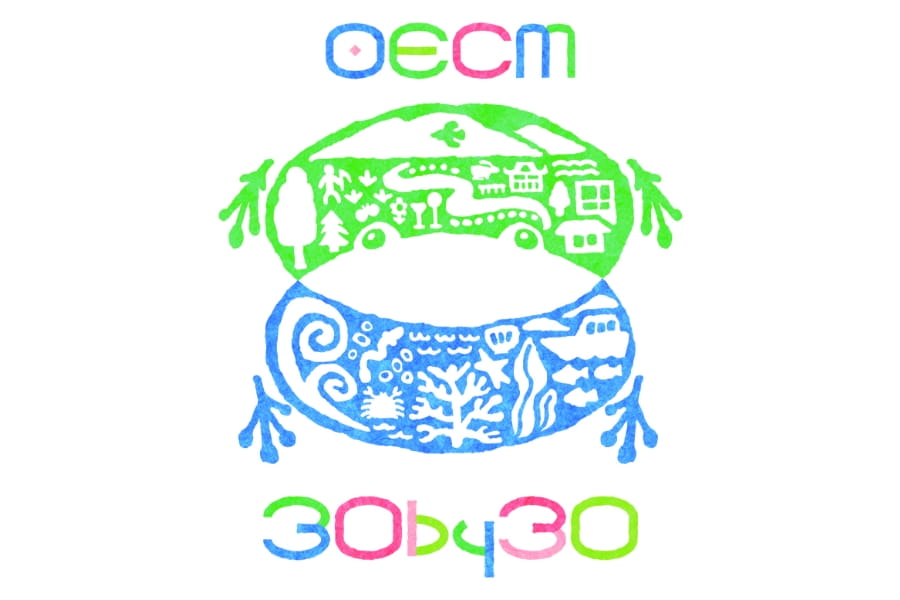Biodiversity
Efforts Towards Achieving Nature Positive
Biodiversity refers to the way living things interact as they coexist on earth. Within this sphere, birds occupy the top position in a local ecosystem pyramid of plants, insects, and small animals, symbolizing the cycle of life. Emblematic of our activities based on the Canon Group Biodiversity Policy is the Bird Branch Project, which Canon has been promoting since 2015. The project encompasses a range of bird-centered activities at operational sites in Japan and overseas.
By 2026, we would like to expand the number of sites participating in the project, from one head office in Shimomaruko (2015) to 60 all over Japan and overseas, and strengthen our efforts.
Nature Positive Initiatives Around the World
Below, we introduce various initiatives aimed at restoring ecosystems and protecting biodiversity, including the Canon Bird Branch Project implemented globally.
Canon Bird Branch Project
Biodiversity refers to the way living things interact as they coexist on earth. Within this sphere, birds occupy the top position in a local ecosystem pyramid of plants, insects, and small animals, symbolizing the cycle of life. Emblematic of our activities based on the Canon Group Biodiversity Policy is the Bird Branch Project, which Canon has been promoting since 2015. The project encompasses a range of bird-centered activities at operational sites in Japan and overseas.
By 2026, we would like to expand the number of sites participating in the project, from one head office in Shimomaruko (2015) to 60 all over Japan and overseas, and strengthen our efforts.
Japan and Overseas Activities
Canon's Shimomaruko headquarters complex in Tokyo includes a greenspace with a wide variety of trees that we call the Shimomaruko Woodland. Under the supervision of the Wild Bird Society of Japan, a monthly census of the migration of wild birds is carried out. The number of observed species has grown from 23 in 2014 to 43 as of the end of 2024, indicating the success of our efforts to promote species diversity.
At Canon Ecology Industry, with the support of experts from the Wild Bird Society of Japan, we have been actively working to attract kingfishers to the retention pond at the site since 2020. This has included releasing small fish species such as gudgeon and ginbuna that are common prey for kingfishers, which has resulted in an adult kingfisher being observed at the site.
In addition to maintaining green space on the grounds, Oita Canon Materials is pursuing greening activities that pay special attention to harmony with the surrounding environment and Japan's four seasons. The subsidiary also installed nesting boxes to create a bird habitat and conducted a seasonal plant and animal life census in collaboration with the National Institute for Environmental Studies, as well as hosting factory tours for elementary school students.
Canon Fuji-Susono Research Park properly maintained and managed the green space that covers 88% of the site, as well as planting trees and installing nesting boxes to create an environment hospitable to incoming wild birds. In addition, we conducted local cleanup activities, including areas surrounding the park office, and held on-site environmental classes and career education for elementary and junior high school students. Canon China held a bird watching event in June 2024 in collaboration with three.
Canon companies in Beijing and Shanghai. More than 50 employees and their families took part, under the guidance of experts. Canon China is also actively disseminating information via its website and social media.
Canon U.S.A. carries out a variety of activities, including Bird Watching Walks, where employees observe wild birds with experts while exploring the premises.
At other sites as well, we have created biotopes, with bird baths and nesting boxes installed and kept clean and measures taken to protect against bird strikes, creating on-site environments conducive to bird life. By sharing successful nesting inside nesting boxes and other activities, it gives employees an opportunity to study aspects of the lives of wild birds even in familiar surroundings. Meanwhile, 12 of our operational sites, including Oita Canon Materials, participate in the seasonal wildlife monitoring scheme proposed by the National Institute for Environmental Studies. Participants report the species of bird, plant, reptile, and insect observed at the site as well as the date on which the first birdsong of each species is heard, the date on which it is first seen, and the date on which each tree or plant begins to flower. These data also make a useful contribution to academic studies.


Contribution to the Global 30by30 Target
The Canon Group in Japan is in the process of acquiring certification as a "nature symbiosis site," a program implemented by the Ministry of the Environment. This project certifies areas where biodiversity conservation is being promoted through private-sector initiatives. It forms part of the Japanese government's plans to protect at least 30% of Japan's land and sea by 2030, as part of the global "30by30" target.
The Canon Global Headquarters' "Canon Shimomaruko Forest" (Tokyo Prefecture), certified in 2023, is a green zone on the headquarters premises where almost 1,000 trees from about 80 species have been planted. In addition to helping conserve the local region's biodiversity, the forest has also been highly praised as an initiative for the Bird Branch Project. In 2024, the Oita Plant of Oita Canon (Oita Prefecture) and the Headquarters of Canon Medical Systems (Tochigi Prefecture) were certified. In 2025, Canon Ecology Industry (Ibaraki Prefecture) was certified as a "Sustainably Managed Natural Site" based on the Act on Promoting Activities to Enhance Regional Biodiversity which came into effect in April of that year. The certified area was registered in an international database as "other effective area-based conservation measure (OECM*)."
- * Other Effective area-based Conservation Measures
The Canon Group Certified as Nature Symbiosis Sites


Initiatives to Support Continuous Use of Sustainable Forestry Resources within Value Chain
To help support biodiversity across the value chain, Canon promotes the use of sustainable forestry resources as the raw materials for the paper used in its products. Having established procurement policies favoring the purchase of paper products derived from sustainably sourced wood pulp in 2015, we sell office paper made under forest certification schemes or using environmentally conscious raw materials.
